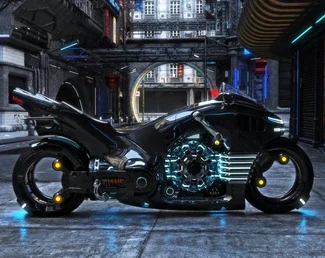Artificial Intelligence (AI) has emerged as a transformative force in various industries, revolutionizing the way we live, work, and interact with technology. The motorcycle industry is no exception, as AI is increasingly being integrated into motorcycles, reshaping the future of riding in profound ways.
AI-powered systems and technologies are enhancing the safety, performance, and overall riding experience for motorcyclists. One of the significant advancements enabled by AI is the development of intelligent riding assistance systems. These systems utilize sensors, cameras, and machine learning algorithms to monitor the environment, detect potential hazards, and provide real-time feedback to riders.
Collision avoidance systems are a prime example of AI in action. Using a combination of sensors and AI algorithms, motorcycles can detect nearby vehicles, pedestrians, and obstacles, issuing warnings or even autonomously applying brakes to prevent accidents. This technology enhances rider safety by acting as an extra set of eyes, mitigating the risks associated with human error and increasing overall situational awareness.
AI is also transforming motorcycle performance. Machine learning algorithms can analyze various factors, including rider behavior, road conditions, and weather data, to optimize engine performance, suspension settings, and traction control. This adaptive intelligence allows motorcycles to adjust their parameters in real-time, providing riders with enhanced stability, control, and responsiveness.
Another area where AI is making significant strides is in the realm of connectivity and smart features. Motorcycles equipped with AI-driven systems can seamlessly connect to smartphones and other devices, enabling features such as navigation, music playback, and voice-activated controls. This integration allows riders to stay connected while on the road, accessing relevant information and services without compromising their safety.
Furthermore, AI is driving innovation in motorcycle design and manufacturing. Designers and engineers are leveraging AI algorithms and simulations to optimize aerodynamics, reduce weight, and improve energy efficiency. These advancements result in sleeker, more fuel-efficient motorcycles that deliver improved performance and a more sustainable riding experience.
AI also holds great promise for the future of autonomous motorcycles. While fully self-driving motorcycles are still in the experimental stage, AI is playing a pivotal role in the development of advanced rider-assistance systems and autonomous functionalities. These systems can assist riders in complex traffic situations, provide adaptive cruise control, and even enable self-parking capabilities. While maintaining rider control and involvement remains a priority, the integration of AI technologies opens up new possibilities for safer and more efficient riding.
However, the widespread adoption of AI in motorcycles is not without challenges. Privacy concerns, data security, and the potential for system malfunctions are among the issues that need careful consideration. Striking a balance between advanced AI capabilities and maintaining human control and decision-making is crucial to ensure the safe and responsible integration of AI in motorcycles.
Furthermore, AI is revolutionizing motorcycle maintenance and service. Intelligent diagnostics systems powered by AI algorithms can analyze sensor data and detect potential issues or abnormalities in real-time. This proactive approach allows riders to address maintenance needs promptly, reducing the risk of breakdowns and optimizing the lifespan of their motorcycles. AI-driven maintenance systems can also provide predictive maintenance recommendations, notifying riders when certain components need attention or replacement based on usage patterns and historical data.
AI is also playing a significant role in the development of advanced rider training and education. Virtual reality (VR) and augmented reality (AR) technologies combined with AI algorithms can create immersive and interactive training simulations. These simulations can replicate various riding scenarios, allowing riders to practice and improve their skills in a safe and controlled environment. AI algorithms can provide real-time feedback, analyzing the rider’s actions and offering personalized coaching to enhance their riding techniques.
The integration of AI in motorcycles is not limited to the vehicles themselves but extends to the overall transportation ecosystem. AI algorithms can optimize traffic flow and manage congestion, reducing travel times and enhancing overall efficiency. Additionally, AI-powered systems can analyze data from multiple motorcycles and riders to identify traffic patterns, road conditions, and accident-prone areas, contributing to the development of smarter and safer infrastructure.
While AI brings numerous benefits to the motorcycle industry, ethical considerations and responsible implementation are paramount. Safeguarding rider privacy, ensuring data security, and addressing the ethical implications of autonomous capabilities are crucial factors that must be addressed. Striking a balance between technological advancements and preserving human control and decision-making is essential to maintain trust and ensure the responsible integration of AI in motorcycles.
In conclusion, AI is transforming the motorcycle industry, revolutionizing safety, performance, maintenance, and rider training. With intelligent riding assistance systems, connectivity features, advanced diagnostics, and predictive maintenance, motorcycles are becoming smarter, safer, and more efficient. As AI continues to advance, the possibilities for innovation and improvement in the motorcycle industry are limitless. By harnessing the power of AI responsibly and ethically, we can shape a future where motorcycles not only provide thrilling rides but also enhance rider safety, promote sustainable transportation, and contribute to a smarter and more connected world. The rise of intelligent motorcycles is an exciting chapter in the evolution of riding, and it holds great promise for a future where technology and human passion converge for an extraordinary experience on two wheels.

